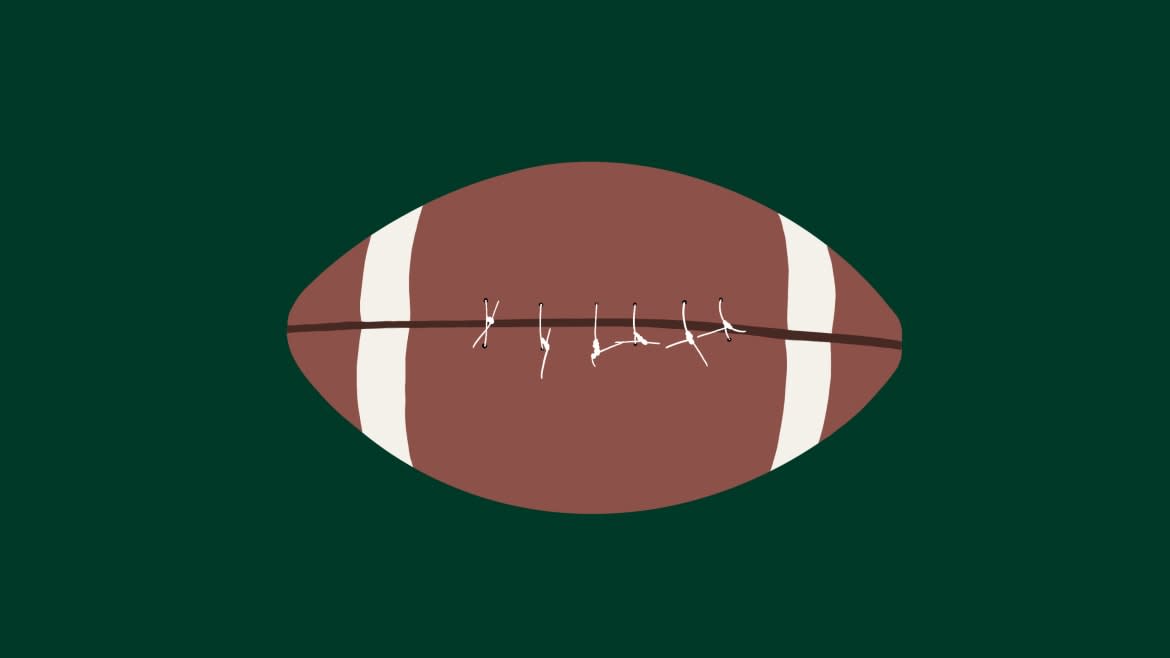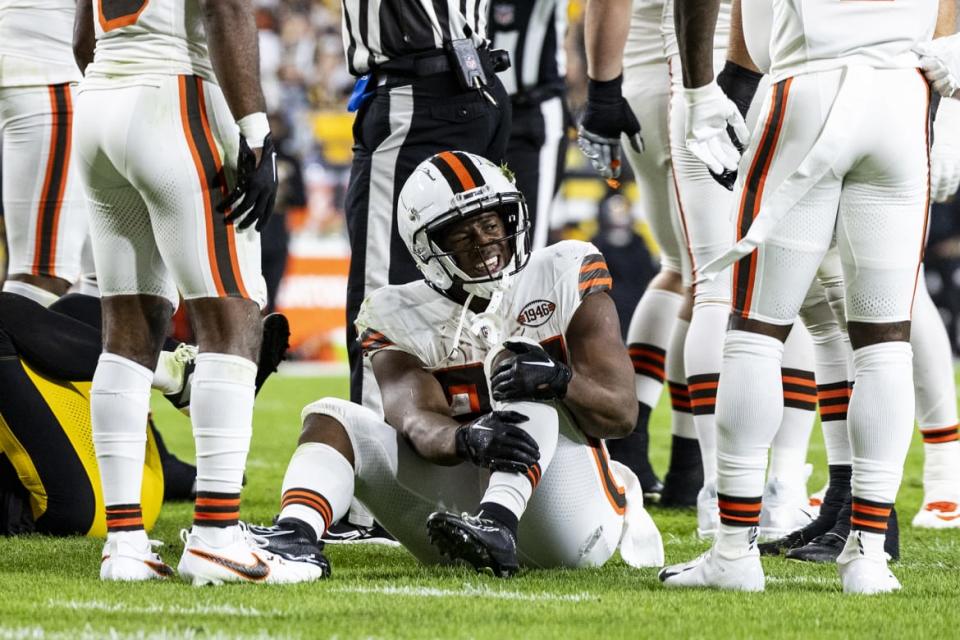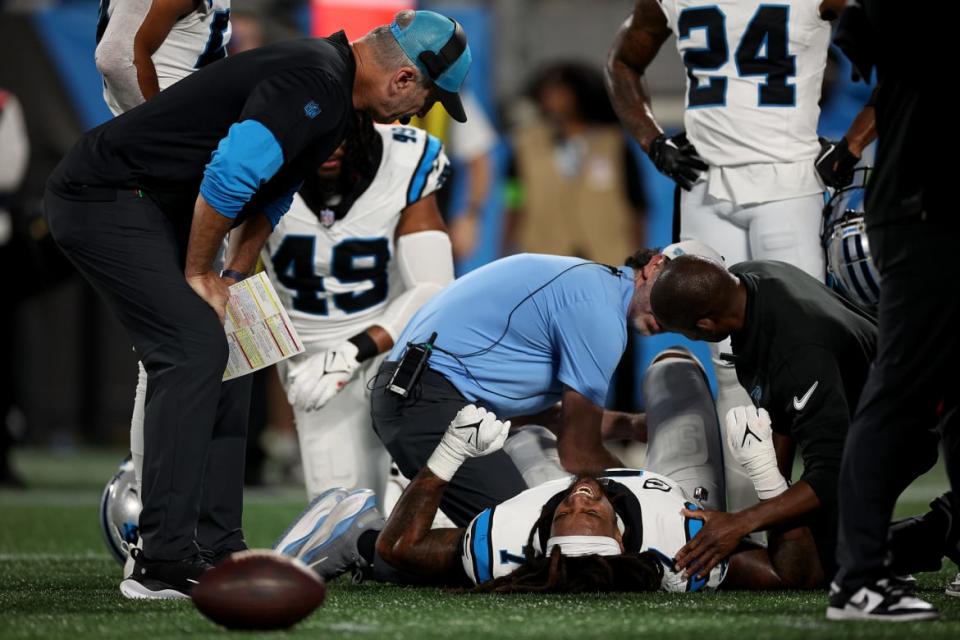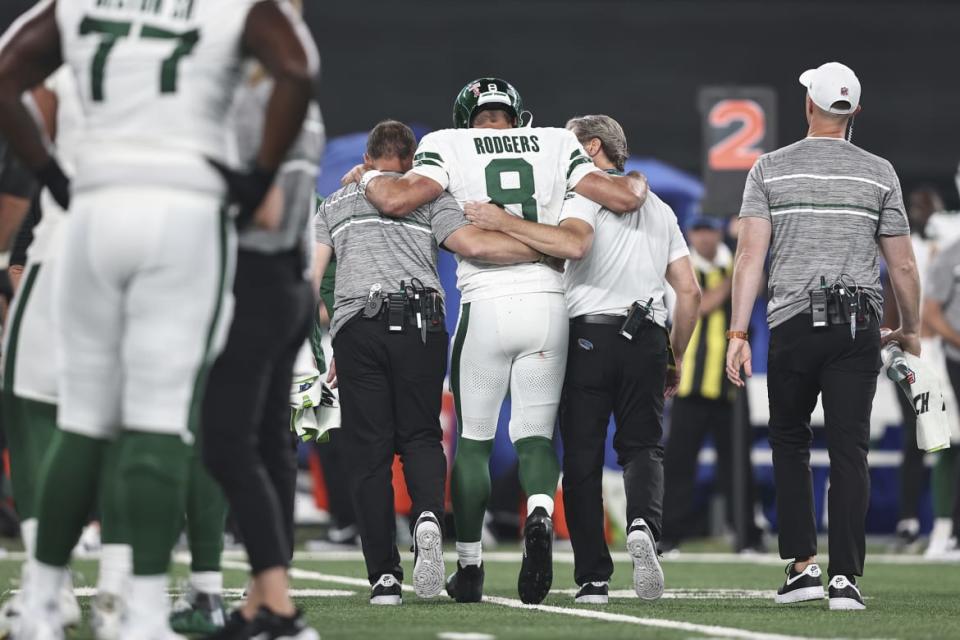NFL Football Players Should Lie to Their Bosses More to Preserve Their Own Health

- Oops!Something went wrong.Please try again later.
- Oops!Something went wrong.Please try again later.
- Oops!Something went wrong.Please try again later.
- Oops!Something went wrong.Please try again later.
Imagine yourself, for a moment, possessing the caliber of strength, speed, and skill that would qualify you to receive handoffs in an NFL backfield. If so, you would likely be just as well acquainted with the glory of 80,000 people cheering you gallop into the endzone as you are familiar with the agony of getting pancaked dozens of times on your fight for a first down.
You might experience what Cleveland Browns running back Nick Chubb went through on Monday night when his knee Oppenheimered from a crash with Pittsburgh Steelers safety Minkah Fitzpatrick so immediately gruesome ESPN did not replay the collision. (You might also experience what Fitzpatrick felt in his hospital bed, while doctors evaluated a chest contusion he suffered in the same game.)
But you’ve gotten this far and want to play. So you might allow yourself, against the advice of your union but in sync with over half of your teammates, to take a substance called Toradol. The drug works by making sure your body (in a sense) doesn’t work, blocking the production of prostaglandins, the lipids sent to clot your blood at the point of injury.
How Barstool Built an Empire by Swiping Sports Highlights
Now, all those prostaglandins hurt, but that’s by design! Pain is a necessary component of the innate processes that your body undergoes to heal itself. But, under the supervision of your team’s medic, you decided to interrupt that process, telling your body to lie to your brain about the extent of your pain, suppressing the will of God and nature just enough to suit up on Sunday morning.
It is within this climate, where rampant painkiller abuse makes football possible, that the NFL filed a grievance against the NFL Players Association (NFLPA), accusing the union of encouraging running backs to lie about the extent of their injuries to secure better deals. The grievance describes the union’s conduct as “a clear violation of the union’s agreement to use ‘best efforts to faithfully carry out the terms and conditions of the [CBA]’ and ‘to see that the terms and conditions of all NFL Player Contracts are carried out in full by players.’” It threatens potential disciplinary action for players caught lying to gain leverage in contract negotiations.
The irony of such a charge is as overwhelming as the league’s lack of shame.

Nick Chubb of the Cleveland Browns reacts after hurting his knee during a game against the Pittsburgh Steelers on Sept. 18, 2023 in Pittsburgh, Pennsylvania.
Lying about injuries is as intrinsic to football as tailgating, face-painting, and—well—getting injured. But if anything, an NFL player who isn’t lying, in some direction, about the severity of an injury probably needs to catch up. For their own good.
I won’t oversimplify the layered dynamic of half-truths, falsehoods, and assurances that “It’s just a flesh wound” upon which the NFL depends for its very existence.
Football players have their reasons for grimacing through obvious injuries that might be life-altering—or even life-threatening—so they can take the field.
Kanye West Storms Out of Interview After Tim Pool Lightly Defends Jews
Obviously, there’s the motivation that comes from the fame of being a football star, the triumph of winning, or the money that comes from both. On that note, many players understand that denting their organs a few times a week is not only their most valuable job skill, it might be their only one. Missing a game to let your body recover might be the difference between keeping your dream alive (and your mortgage paid) or getting replaced by the younger, hungrier, and slightly less broken man behind you on the depth chart, gunning for your job.
Nathan Kalman-Lamb, a sociologist and author of Game Misconduct: Injury, Fandom, and the Business of Sport, told me this well-worn dynamic can be understood through the term “structural coercion,” which describes the social and economic conditions that force people, including athletes, into borderline illusory “choices.”
“People are compelled to make choices they would not otherwise wish to make if they weren’t constrained by racial capitalism,” said Kalman-Lamb, referring to the economic system that, simply put, illustrates why the cabal of billionaires accusing players of faking injuries are white and most of the athletes themselves are not. “But,” he added, “if one’s participation is a function of material need or privation, did they really ‘sign up’—that is, consent—or was it a form of structural coercion?”
You don’t need a doctorate or be literate in the latest jargon to understand what Kalman-Lamb is saying.
Have you ever signed up to work a double with a bad back or while shaking off the flu? Or maybe you’re reading this article from your cubicle even though you can hear the COVID coughs echoing from the break room.

Shaq Thompson of the Carolina Panthers is looked over on the field after being injured against the New Orleans Saints during the first quarter in the game at Bank of America Stadium on Sept. 18, 2023 in Charlotte, North Carolina.
See? You get it.
You also don’t even have to examine the near-catastrophe of Buffalo Bills safety Damar Hamlin’s on-field heart attack last year to know that players aren’t ignorant about the risks of taking the field. But the problem for players, and their employers, is that they have far more clarity about their so-called options and their consequences.
The severity of repeated traumatic brain injuries has been abundantly and tragically proven, and was the subject of multiple documentaries and feature films, even though the league rejected the growing, independent scientific consensus.
NFL Proves Yet Again It Doesn’t Give a Damn About Black Players
Retired NFL players wrestle with the same league in court over being denied health benefits to treat ailments they are convinced were the direct result of competing through pain. Just last week, after Aaron Rodgers tore his Achilles on MetLife Stadium’s artificial turf just four plays into his New York Jets career, the union begged the league to convert its remaining turf fields to grass instead. Commissioner Roger Goodell dismissed the union’s extensive data about the relative safety of grass by claiming that, well, some players prefer turf, muddying a clear consensus and settled debate.
None of these well-documented deceptions made it into the memo. But you already know why.

Aaron Rodgers of the New York Jets is helped off the field for an injury during a game against the Buffalo Bills at MetLife Stadium on Sept. 11, 2023 in East Rutherford, New Jersey.
“The NFL is built on players ‘misleading’ others about the severity of their injuries,” said Kalman-Lamb. “If they didn’t, there would be no labor force to perform commodity spectacle. It’s awfully rich of the NFL to start worrying about that now.”
Running backs, who are at the center of the league’s grievance, are exposed to the worst of the league’s dysfunction. At an average of 2.5 years, the physical toll of their talents leaves them with the shortest careers of any position in their sport.
For decades, this was at least balanced by being some of the highest-paid players on their teams. But halfbacks in the modern NFL have seen the market for their services collapse as league offenses reorient themselves around passing the ball instead of stuffing it in the trenches.
The New York Giants running back Saquon Barkley turned down a contract extension offered after multiple injury-plagued years, betting on himself. Then, he played the best football of his life, only to enter a free agent market where the big, multi-year guarantees he expected after setting a career-high in rushing yards were gone. After a prolonged contract battle, he’s back with the Giants on a one-year deal that might net him an extra $900,000 if he can reach performance incentives.
While we’re here: Barkley suffered a high ankle sprain last Sunday that was initially expected to leave him sidelined for two to three games. Just two days later, Giants head coach Brian Daboll wouldn’t immediately rule his star RB out for the team’s Thursday night game against the San Francisco 49ers. Again, Barkley has at least nine hundred thousand reasons to suit up. The Giants eventually confirmed he wouldn’t play, but if Saquon pushed through it’s not because his coach kissed his boo-boos.
LeBron James’ Visit to Saudi Arabia Is Sportswashing at Work
Players know what time it is and, as they always have, are working their best within a system designed to, as Kalman-Lamb put it, “maximize the amount of value that can be extracted from their bodies on the field.”
So what is a player, especially a player facing plummeting earnings, to do? Should they tell the unvarnished truth—that with a few extra pills and a team prayer they can, technically, grimace their way to a few extra yards and a few more surgeries? Or, should they use whatever leverage available to, at absolute worst, beat the league at its own game?
If players are truly overselling their injuries, they might be approaching the status quo. So, to players, I say: Sin boldly. Lie for yourself and your health. Because at least this time, a white lie might benefit your skull and spine as much as you hope it ups your salary.
Get the Daily Beast's biggest scoops and scandals delivered right to your inbox. Sign up now.
Stay informed and gain unlimited access to the Daily Beast's unmatched reporting. Subscribe now.

